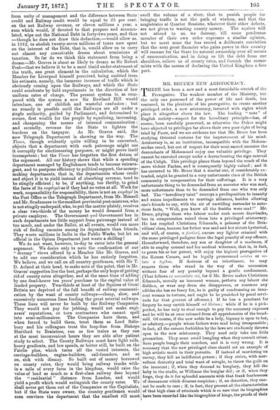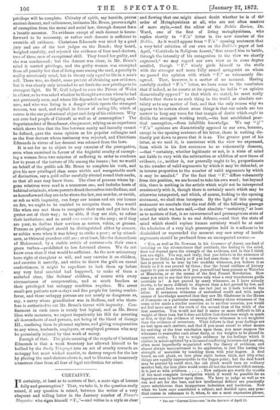MR. BRUCE'S NE1V ARISTOCRACY.
TRERt has been a new and a most formidable stretch of the Prerogative. The weakest member of the Ministry, but the only one possessed of the power of life and death, has ventured, in the plenitude of his prerogative, to create another privileged order, a new aristocracy, invested with rights which place it altogether above the law. The leading " note" of English society—respect for the hereditary principle—has, of course, been carefully preserved, as otherwise the Dukes might have objected to privileges far above their own poor right of being tried by Peers, and we see evidence too that Mr. Bruce has been studying Oriental customs for the improvement of his mind. Aristocracy is, as an institution, incompatible with the Moham- medan creed, but out of respect for their semi-sacred ancestor the descendants of Mohammed enjoy one valuable privilege. They cannot be executed except under a decree bearing the sign-manual of the Caliph. This privilege places them beyond the reach of the more violent Pachas, and is consequently highly valued ; and it has occurred to Mr. Bruce that a similar one; if considerably ex- tended, might be granted to a very unfortunate class of the British community in compensation for their sufferings. It is a very unfortunate thing to be descended from an ancestor who was mad, more unfortunate than to be descended from one who was only bad. The "hereditary taint" conveys a predisposition to insanity and raises impediments to marriage alliances, besides allowing one's friends to say, with the air of unwilling surrender to noto- rious facts, " Well, you know all the Smiths were mad !" Mr. Bruce, pitying those who labour under such severe drawbacks,. has in compensation raised them into a privileged aristocracy. He has respited Christiana Edmunds, a poisoner of the Brin- villiers' class, because her father was mad and her sisters hysterical, and will, of course, a fortiori, excuse any lighter criminal with the same privileged pedigree from the legal penalty of any offence. Henceforward, therefore, any son or daughter of a madman, if able to employ counsel and fee medical witnesses, that is, in fact, to prove his or her patent, will enjoy the highest prerogative of the Roman Csars, and be legally pronounced sointus or so- lutct a legibus. If desirous of an inheritance, he may remove those who stand in the way of the succession without fear of any penalty beyond a gentle confinement. (That follows ex necessitate rei, for if Mr. Bruce makes Christiana Edmunds, morally an innocent woman, perform any labour she dislikes, or wear any dress she disapproves, or consume any edibles she has no fancy for, he is guilty of condemning an inno- cent woman to torture, and ought to be punished by penal servi- tude for that gravest of offences.) If he has a penchant for forgery he may enrich himself ad libitum ; while if he is a pick- pocket, he has only to steal enough to pay the necessary expenses and he will be at once released from all apprehension of the tread- mill. Of course, if the new noble be a lady, bigamy is open to her, or adultery,—people whose fathers were mad being irresponsible ; in fact, all the careers forbidden by the laws are studiously thrown open to the new aristocracy. They need only take one little precaution. They must avoid bungling when they commit crime. Sane people bungle their murders, and it is very wrong. It is necessary that the new privileged class should set an example of
high artistic merit in their pursuits. If instead of murdering an enemy, they kill anindifferent person ; if they strive, with mar- vellous dexterity and total want of scruple, to throw the guilt on the innocent ; if, when they descend to burglary, they kill the baby in the cradle, as Williams the burglar did ; or if, when they forge, they do it for splendid amounts with that frank fearlessness of demeanour which disarms suspicion ; if, on detection, they can- not be made to care ; if, in fact, they present all the characteristics of that high class of criminals which is so rare that its biographies have been recorded like the biographies of kings, the proofs of their
privilege will be complete. Chivalry of spirit, say heralds, proves ancient descent, and callousness, intimates Mr. Bruce, proves a right of exemption from the moral and social law, through descent from a lunatic ancestor. No evidence except of such descent is hence- forward to be necessary, or rather such descent is sufficient to override all evidence. Christiana Edmunds was tried by a good jury and one of the beat judges on the Bench ; they heard, weighed carefully, and rejected the evidence of four mad-doctors, two of them men of exceptional skill. They found her guilty, and she was condemned ; but the descent was clear, in Mr. Bruce's mind it carried privilege, and the guilty woman was exempted from all penalty but that of living sane among the mad, a penalty in reality atrociously cruel, but in theory only equal to life in a nun's cell. There was, no doubt, some pretext of obtaining new evidence, but it was clearly only intended to set forth the new privilege in its strongest light. Sir W. Gull helped to cure the Prince of Wales in a fever, so he was asked whether he thought a woman whom he had not previously seen, and whose life depended on her feigning mad- ness, and who was living in a danger which upsets the strongest reasons, was mad, and replied in favour of saving life, which of course is the one professional object and duty of his existence. Why not cure bad people of Calcraft as well as of consumption ? The Superintendent of Broadmoor, also present, relying on an experience which shows him that the line between sanity and insanity cannot be defined, gave the same opinion as his popular colleague and as the four doctors whose testimony was rejected, and Christiana Edmunds in virtue of her descent was released from the laws.
It is not for us to object to any exercise of the prerogative, even when exercised in favour of the frightful cruelty of exempt- ing a woman from two minutes of suffering in order to condemn her to years of the torture of life among the insane ; but we would on behalf of the public ask Mr. Bruce to complete his work, and give his new privileged class some viaible and recognizable mark of distinction, say a gold collar carefully riveted round their necks, so that all men may know them. The class of persons whose by- gone relatives were mad is a numerous one, and includes hosts of habitual criminals, whose parents drank themselves into Bedlam; and as henceforward they are to be above the law, can murder, or ravish, or rob us with impunity, can forge our names and set our houses on fire, we ought to be enabled to recognize them. One would like when one met them to recognize their rank and get into the gutter out of their way ; to be able, if they are rich, to refuse their invitations, and so avoid nux vonaica in the soup ; or if they are poor, to decline their services as nurses, valets, or grooms. Persons so privileged should be distinguished either by armour, as nobles were when it was felony to strike a peer ; or by attend- ants, as Oriental grandees still are ; or at least, like the descendants of Mohammed, by a visible article of costume—in their case a green turban—prohibited to less favoured classes. We do not know even then if that would be sufficient. As the new aristocracy have right of slaughter at will, and may exercise it on children, and exercise it secretly, and strive to throw the guilt on casual confectioners, it might be expedient to lock them up before any very fatal mischief had happened, to make of them a secluded class, like Sultans' children, of course with every circumstance of compensation, and as much freedom as their privileged but unhappy condition requires. We arrest small-pox patients now-a-days and fine people for having scarlet- fever, and those unhappy persons are not nearly so dangerous as, say, a navvy whose grandfather was in Bedlam, and who there- fore is authorized to cut Mr. Bruce's throat with impunity. Con- finement in such cases is surely but logical, and as Mr. Bruce likes wide measures, we expect impatiently his Bill for arresting all descendants of mad persons, not being of the blood of George III., confining them in pleasant asylums, and giving compensation to any wives, husbands, employers, or employed persons who may be pecuniarily injured by that work of mercy.
Enough of that. The plain meaning of the respite of Christiana Edmunds is that a weak Secretary has allowed himself to be bullied by the Da ily Telegraph into an act of cruelty towards an unhappy but most wicked convict, to destroy respect for the law by placing the mad-doctors above it, and to liberate an immensely numerous class from all fear of legal retribution for crime.



































 Previous page
Previous page